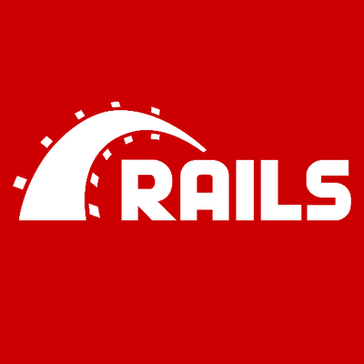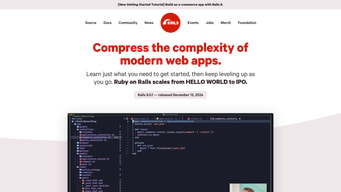

Unclaimed: Are are working at Ruby On Rails ?
Ruby On Rails Reviews & Product Details
Ruby on Rails, often referred to as Rails, is an open-source web application framework written in Ruby. It emphasizes convention over configuration (CoC) and the don't repeat yourself (DRY) principle, aiming to simplify and accelerate web development by providing default structures for a database, a web service, and web pages. Rails enables developers to use a model-view-controller (MVC) pattern to organize application programming. Its rich ecosystem of gems (libraries) allows for rapid development of complex web applications.

| Capabilities |
|
|---|---|
| Segment |
|
| Ease of use |
|
| Deployment | Cloud / SaaS / Web-Based, N/A, On-Premise Linux, On-Premise Windows |
| Support | FAQs/Forum |
| Training | Documentation |
| Languages | English |



I think the best in Rails is the way that everything you expect to have is there. And the great community behind the framework. There is a loot of tools (gems) that help you in the process of building a great software. And there are some others tools that can be used to improve the performance or even to improve the way you do the code.
The speed, in comparison with other web frameworks the speed is not the best.
I doing web pages, so it helps me doing that. Currently working on several products and Rails help me a lot from the start because it's really easy to setup, and the is easy to continue with the maintenance of the product if what you do it good, otherwise you can get in a mess.
Convention over configuration concept. Usual features for web applications are available in a box way.
Many things happens hide from the developer eyes, this can be dangerous for inexperience programmers.
My team is building the world's best hotel metasearch using Ruby on Rails. Productivity in a test-driven web application.
Ruby on Rails is easy to learn. You can go from knowing nothing about it to a full blown web app in less than one day. You should know how to program, of course. But the point is that it's easy to use and time to deploy is quick and relatively painless especially with a tutorial, something like Pragmatic Ruby is a good one.
It's slow. Once you have a big app, it can be bloated, and take a lot longer to run things than if say, it was all in C. So there is a compromise, between easy of use and performance. But, the bright side is that there is an active community constantly trying to improve Ruby on Rails and make it better, and faster.
Have created a web app with Ruby on Rails that thousands upon thousands of users use daily to improve their lives.
We use Rails as a web API for our mobile app. It has many tools right out of the box and has many conventions that makes many configurations unnecessary, which make it very quick and easy to deploy. The Rails has an awesome documentation and a community is enormous, and just about every beginner question has been answered, this makes it very beginner friendly despite the poorly documented underlying language Ruby. Because of the size of the Rails community, there are many third party gems that cater to your needs.
The "conventions over configurations" philosophy behind Rails can also be frustrating to some developers looking for a more customizable solution. For example, as a web API, Rails has a simple-to-use JSON parsing tool as long as the JSON structure mirrors your underlying models. However, if you want to create custom JSON, this can result in extremely verbose and ugly code.
We use Rails as a web API for our mobile app, this includes using Rails to communicate with the database, and other services that we use, such as ElasticSearch, Amazon S3 etc.
* Easy to setup. * Lots of tools (gems) to choose from * Very flexible, works with many frameworks * Asset pipeline is really nice * Great community - very large and active. * Still under very active development. * It's free. * Good performance. * Lots of good assumptions, promotes good application structure. * TDD
* ActiveRecord - it's good for people who are new to this field. But it's really easy to fall into its traps. * Scaling can be tricky, especially for newcomers. * Doesn't enforce good practice. People can easily write bad code to get things done.
A high performance web based application that serves both internal and external users. Connects to multiple databases and integrates with data analytics application to run data analysis and generate mass amount of pdfs. Integrates with 3rd party APIs.
The convention over configuration mentality is the best thing about Rails. I have worked at so many places where they used their own framework concoction or it grew up organically, and you spend the first weeks just learning the framework, and then the rest of your work-life trying to solve problems in that framework that have been solved by way smarter people than you. This is what Rails solves in a simple, easy to learn, great documentation and scalable way.
The sluggishness of the framework. It's definitely plenty fast for most use cases it's just that I know I'm wasting a looot of cycles on the Rails framework. It's totally worth it and hardware is dirt cheap, it's just that my service is not so revenue intensive so any corner that can be cut is worth looking into.
I use it for every new and current app that I am maintaining and using as a hobby project. Have worked at large-medium sized corporations that used it for hosting a customer facing dashboard and a sales website.
Convention over configuration. Easy to get a web project up and running with a nice framework to work in.
Not scalable for large web projects. Although convention over configuration approach can help speed up development for most projects, it can sometimes get in the way when you have requirements that don't "fit into the box" that Rails provides.
Custom software that doesn't fit into the box of a standard CMS. Have done other projects with more varied requirements as well.
What I love about Ruby on Rails is that it's so easy to just start working on something an get things running fast. We have build fully running products in just a few weeks from inception.
Rails can sometimes be quite intimidating for someone who has just started out, especially if they are from a background of non-scripting languages.
We are building platforms that make business for users much easier by consolidating all their work in one place. The best benefit is the speed that allows us to go through the learning cycle really fast.
- based on Ruby, the most flexible and up-to-date of all programming languages that are in common use today - quick to set up new projects with solid testing and security
- some core features don't scale and become unusable in very large projects, so you end up replacing them or working around them - there are still some rough edges in the latest version, such as modified Ruby core classes or errors pertaining to advanced database features
- hosting a complex community and donation website - metaprogramming features help setting up diverse payment service APIs - permanent change and refactoring is relatively easy thanks to good migration and testing frameworks
The extensibility is remarkable. The Ruby on Rails gem community is still thriving. I have not run into many problems where gems were out of date, or didn't work as intended most of the time. Rails security appears to be strong especially with the default options that help prevent common vulnerabilities like CSRF and XSS.
The learning curve when first getting started is relatively steep. It takes a while to get used to the asset pipeline, and some of the configuration that's required to move on from a simple app.
I currently develop two Rails products. One is an internal application developed for a security company, and the other is a public facing app called Preferred Athlete Scouting Services. The former solves a problem for our company relating to generating vulnerability reports to our clients, and sharing/collaborating on projects and reports between employees. The latter is a basketball player management system that provides access to important information regarding potential women's basketball recruits to college scouting programs.